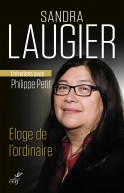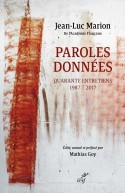
Morale et chaos
de Pierre Caye
Collection La Nuit surveillée
352 pages - oct. 2008
38,00€
Le chaos définit notre siècle. Rien d'apocalyptique dans cette affirmation, qui ne condamne pas nécessairement le monde à l'état de cendre et de poussière. Le chaos définit simplement l'imprévisibilité, l'imprédictibilité et l'incertitude de nos sociétés complexes et instables dont l'homme maîtrise de moins en moins l'évolution. Jusqu'à aujourd'hui notre morale reposait essentiellement sur la maîtrise. Il nous faut maintenant apprendre à vivre autrement, c'est-à-dire en fonction de l'immaîtrisable. Ce qui ne signifie pas qu'il faut consentir au chaos comme s'il nous était destiné. Le chaos n'est ni bon ni mauvais, il n'est ni pour l'homme ni contre l'homme : il lui est étranger. Et c'est pourquoi il requiert au fond de nous une force qui, sans prétendre accéder à la maîtrise du monde, nous permette d'assumer et d'affronter son étrangeté. Cette force, je l'appelle « l'Empire de soi ». L'Empire de soi se distingue de la maîtrise de soi. Il s'agit non pas pour l'homme de dompter les énergies et les pulsions qui le traversent, mais, au contraire, de faire l'expérience initiale de son impuissance face au chaos du monde, afin de construire, à l'épreuve de sa faiblesse et de ses fragilités originaires, sa force la plus propre. « Morale et chaos » décrit ainsi les étapes de la constitution de cette force que le sentiment même de notre impuissance permet de constituer, sans fondement, mais par notre seule capacité à endurer le temps et à s'y maintenir pour mieux y passer et le faire passer à travers lui-même.
--
The word chaos defines our century. There is nothing apocalyptic in that statement, which does not necessarily condemn the world to end in cinders and dust. Chaos simply defines its unpredictability, and the precarious nature of our complex, unstable societies whose evolution we control less and less. Until today, our morals depended largely on control. But we must now learn to live differently, i.e. while dealing with the uncontrollable. Which does not mean we must accept chaos as though it were our destiny. Chaos is neither good or bad, neither for or against man: it is simply alien. That is why it requires a force deep inside, one which permits us to assume and face its alien nature without aspiring to control the world. That force, I call ‘Self-authority’. Self-authority is different from self-control. It’s not a case of man taming the energies and drives he undergoes; on the contrary, he must initially experience his powerlessness in the face of the world’s chaos in order to construct, despite his weakness and inherent fragility, this most personal force. Thus ‘Morale et chaos’ describes the stages of construction of that force, built with the help of the very awareness of our helplessness, without foundations, through our sole capacity to endure.
--
The word chaos defines our century. There is nothing apocalyptic in that statement, which does not necessarily condemn the world to end in cinders and dust. Chaos simply defines its unpredictability, and the precarious nature of our complex, unstable societies whose evolution we control less and less. Until today, our morals depended largely on control. But we must now learn to live differently, i.e. while dealing with the uncontrollable. Which does not mean we must accept chaos as though it were our destiny. Chaos is neither good or bad, neither for or against man: it is simply alien. That is why it requires a force deep inside, one which permits us to assume and face its alien nature without aspiring to control the world. That force, I call ‘Self-authority’. Self-authority is different from self-control. It’s not a case of man taming the energies and drives he undergoes; on the contrary, he must initially experience his powerlessness in the face of the world’s chaos in order to construct, despite his weakness and inherent fragility, this most personal force. Thus ‘Morale et chaos’ describes the stages of construction of that force, built with the help of the very awareness of our helplessness, without foundations, through our sole capacity to endure.
- Dimensions : 135x215x25
- ISBN : 9782204086462
- Poids : 460 grammes






